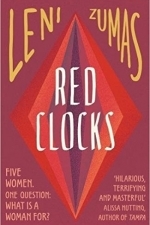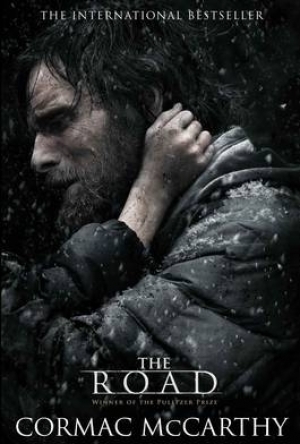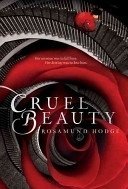Goddess in the Stacks (553 KP) rated Red Clocks in Books
Jul 31, 2018
I think the cover description oversells the book a little. I wouldn't call Gin's trial "frenzied" nor the drama exactly "riveting" but it did keep my attention throughout the book. I really enjoyed the relationships between the characters, and the point that none of them really know what is going on in each other's personal lives. One moment I particularly liked is slightly spoilery, but I loved how Ro was able to put her personal feelings aside to help Mattie, her student. That was really, really hard for her, but she recognized how much damage it would do to Mattie to not help her.
I think I found Gin the most interesting - given all the reading I've been doing lately about autism, her entire personality screams autism to me, but she was never labeled as autistic. So I'm marking her as a possibly autistic character. (I'd love if any of my autistic readers could weigh in on that, if you've read the book!) Between preferring to live in the woods with animals and NOT around people, specifically, and the way she reacts to the textures and smells in the jail when she's arrested (shoving the bleach-scented blankets as far away in the cell as possible, and refusing to eat the food), and how she stumbles over her answers in the courtroom when she's interrogated - it seems likely.
My only actual complaint about this book had nothing to do with the writing or plot! But it refers to the ghost pepper as "the hottest pepper known to man" which the Carolina Reaper growing in my backyard would have an issue with!
Other than that very minor quibble, I thought this dystopia was pretty good. I'm always interested in Reproductive Rights-related dystopias. This isn't as good as The Handmaid's Tale, but it's MILES better than Future Home of the Living God. It's good at showing the lengths women will go to, to ensure their own reproductive freedom. Outlawing abortion doesn't eliminate abortion. It just makes it less safe.
You can find all my reviews at http://goddessinthestacks.wordpress.com
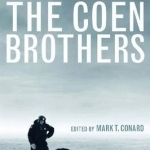
The Philosophy of the Coen Brothers
Book
In 2008 No Country for Old Men won the Academy Award for Best Picture, adding to the reputation of...
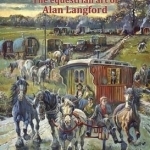
Welgora: A New Forest Artist's Book
Book
WELGORA: The Equestrian Art of Alan Langford is written by the New Forest artist Alan Langford and...

Stash2Go: Knitting App for Ravelry
Lifestyle and Entertainment
App
*** IMPORTANT: If you have issues or questions: email me at questions@stash2go.com *** *** You can...
This is a scenario people may have to face one day, especially with the shape the world is in today. Even now people are faced with sticking with their morals and values, from helping our fellow man to the decision of holding a door open for a stranger. The Road, Cormac McCarthy's Pulitzer Prize winning novel, brings the very question of humanity to the forefront, as well as how hard it is to hold onto it.
The father, The Road's main character, takes us on a journey through the mountains in a burned-out America, but the fires that took over are never explained and they didn't need to be. Apparently having been on the move for a couple of years, he wants to take his young son South to survive the winter months that are very close by. Readers get glimpses of what happened the night the grid went down from the father's point-of-view, but so many years have passed that the memories are few, the facts aren't completely straight, and any type of life before the fires seems to have been just a dream. So the two begin the story heading South, dragging everything they have scavenged in their travels inside of a metal shopping cart, and the father isn't sure they'll make it out of the mountains before winter. He only has tattered pieces of a map that they have carried for a long time, having numbered each piece with a broken crayon they had found, making it hard to estimate how far they need to travel.
While traveling, they very rarely run into other people, at one point, when they run into a very bad man, the father realizes he hasn't spoken to another person (other than his son) in at least a year. This is mostly because the majority of people that are still alive are the type of people that would rather kill you and take whatever you have than speak to you. Even most of the houses they come upon are burned and abandoned, but the father sees these buildings as a chance to find food and supplies: "The roadside hedges were gone to rows of black and twisted brambles. No sign of life. He left the boy standing in the road holding the pistol while he climbed an old set of limestone steps and walked down the porch of the farmhouse shading his eyes and peering in the windows. He let himself in through the kitchen. Trash in the floor, old newsprint. China in a breakfront, cups hanging from their hooks. He went down the hallway and stood in the door to the parlor. There was an antique pumporgan in the corner. A television set. Cheap stuffed furniture together with an old handmade cherrywood chifforobe. He climbed the stairs and walked through the bedrooms. Everything covered with ash. A child's room with a stuffed dog on the windowsill looking out at the garden. He went through the closets. He stripped back the beds and came away with two good woolen blankets and went back down the stairs. In the pantry were three jars of homecanned tomatoes. He blew the dust from the lids and studied them. Someone before him had not trusted them and in the end neither did he and he walked out with the blankets over his shoulder and they set off along the road again. " The young son is usually left close by outside because he seems scared that either there will be bad people or dead people inside.
Throughout this incredible, heart wrenching novel, the father slowly becomes more ill with what seems to be a case of pneumonia, possibly caused by all of the ash that is in the air from the fires; this makes him cough uncontrollably. Yet, he doesn't focus on that he may not live too much longer, instead he tries everything to get his son as far South as possible without too much of a plan of what to do when they get there.
The horror of this book is brought to light by the realism of what could happen if the world were to end, when people lose their humanity and begin to kill and eat their fellow humans. It leaves us wondering if we could hold onto what we are today when the basic need for shelter and food become more important than another person's life. But the father and son are examples of the few individuals who are able to hold onto their humanity during the end of the world: they share supplies if they can, they don't kill humans or animals to feed themselves, and they live by one rule: if a person is still alive, they take nothing from them.
The struggle these two go through is very real and believable, and McCarthy's writing is so well done that this book is hard to put down. Even while reading, most won't notice that there is only one character in the entire story that is given a name; our two main characters are never addressed by anything other than Papa or son/boy. The father's worry about keeping his son alive and unharmed is heartbreaking, for instance, one scene where he believes that he and his son are going to be found by cannibals, he quickly goes over with his son on how to shoot himself with the pistol, so neither of them will be taken alive. As a parent, I choked up in quite a few scenes, including this one - - - and as with the film adaptation, I cried heartily at the end.
This emotional, dark novel is an amazing book to read. The Road is bound to leave readers questioning what they would do in the same circumstances as the father. I highly recommend this book to people who love dystopian novels, but beware, this is a story you won't be able to forget.
Gareth von Kallenbach (980 KP) rated The Invisible Man (2020) in Movies
Feb 27, 2020
Cecilia is trying to escape from her controlling and abusive husband who despite being considered a wealthy genius in the field of Optics; has made her life a living hell and forces her to make a daring escape that has her barely getting away with the help of her sister Alice (Harriett Dyer).
The film picks up two weeks later where Cecilia is hiding with a friend of her sister Officer James Lanier (Aldis Hodge) and his daughter Sydney (Storm Reid). Cecilia is scared to even leave the house and do simple tasks such as checking the mailbox and is livid when her sister comes to visit as she is sure that her husband will find her by tracking her Sister.
Alice informs Cecilia that her husband has killed himself and she is now free to live without fear. Cecilia gets a letter informing her that she is to receive 100K a month to the sum of five million dollars as part of her husband’s will. The fact that nobody should have her mailing address does seem odd to her as does that fact that the estate is being handled by her ex’s brother Tom (Michael Dorman).
With her new wealth Cecilia gifts James and also sets up a school fund for Sydney and begins to emerge from her shell.
It is around this time that unusual things begin to happen to her. A lost item from the night of her escape shows up and a mysterious kitchen fire starts. Cecelia also wakes up to find the covers off the bed and what appears to be something unseen standing on the blankets when she attempts to pull them up.
When she expresses her concerns to James that her husband is alive and exacting revenge, both he and Tom ignore her and when things begin to escalate, Cecilia is the one who starts to look more and more unstable as the tormenting continues and her life spins out of control.
The film is Written and Directed by Leigh Whannell who rose to prominence as one of the co-creators of the “SAW” franchise. The film is the perfect example of how to do a film of this sort as it is very clever in how it is paced and allows for the suspense to build without relying on many of the standard Horror Film staples.
The film is also good about having things happen before it pulls back so it is not an extended series of intense moments but several incidents between the tension and setup.
The cast is very good and what is amazing is that the film was made for a $7 million dollar budget yet looks every bit of a major studio film.
There are some interesting twists along the way as while I was able to predict two of them; the others were a very nice surprise.
It is so refreshing to see a film like this come along as in many ways it can help redefine the Horror genre and proves that you can make a quality movie that is also scary and intense.
I for one hope we see more from this franchise in the near future.
4.5 stars out of 5.

Paytm Mall : Online Shopping
Shopping and Lifestyle
App
Paytm Mall is India’s premier online shopping app - brought to you by Paytm, India’s most...

Myntra - Fashion Shopping App
Shopping and Lifestyle
App
Swipe, select and shop! It’s fashion on the go with the all-new Myntra mobile app. Take the world...

Knitting Tutorials for Beginners - Learn How to Knit Easily
Education and Lifestyle
App
Learn an easier, faster, more enjoyable method of knitting that is kinder to your hands, neck and...
Sophia (Bookwyrming Thoughts) (530 KP) rated Cruel Beauty in Books
Jan 23, 2020
Well, Cruel Beauty is the cruel version of our beloved Disney characters. At least, that's what I thought at the very end. It's also got mythology, in which some I researched and learned new things (verification purposes). About time I'm not staring at what I learned in middle school/early high school over and over again.
Truth is, I enjoyed the concept of Cruel Beauty, but I didn't really enjoy the story... not too much. What originally caught my attention was the very fact that "Belle" is destined to marry the "Beast" ever since she was young due to a bargain her father made (reminds me of another story I can't think of currently). What I thought was even more interesting is how Rosamund Hodge bases the novel on ancient civilizations and mythology, particularly Pandora's box. Actually, I thought it was genius. I also think I've spoken too much about the book with those two words.
What started to lose my attention was this particular sentence... when Nyx – "Belle" of the story – is first married to the Gentle Lord – "Beast" of the story – and makes her entrance into his castle.
<blockquote>“I’m here!” I shouted. “Your bride! Congratulations on your marriage!”</blockquote>
I was like, really? THAT'S how you would make your entrance inside a demon's castle? Me, I would actually start plotting ways OUT of the castle, ways to avoid the Gentle Lord, etc. etc. NOT announcing, "Oh hey! I'm here! Come and feast on me!" *waves big sign*
And the Gentle Lord, no matter how much I like his humor, made a very unimpressive entrance.
<blockquote>In one moment I realized that what tickled my neck was a tuft of black hair, the blankets were a warm body, and the Gentle Lord was draped over me like a lazy cat, his head resting on my shoulder.</blockquote>
His reason?
<blockquote>“I got so bored waiting that I fell asleep too."</blockquote>
And...
<blockquote>“You were a good pillow."</blockquote>
DUDE. Sleeping on your bride when you first meet her even though you're now married? What an impressive husband you make. He could have slept next to her and not on top of her. You know, if a stranger – homeless or not – slept on top of me, I may kick said person's butt until they get off and call it self defense. I suppose some are now worried about my future. I'm completely surprised Nyx didn't mention that he was heavy, sleeping on top of her like that. Instead, this is her response shortly after:
<blockquote>“I’m sorry ,” I said, staring at the floor. “I just, my father made me promise to bring a knife, and— and—” I stuttered, acutely aware that I was half-naked in front of him. “I’m your wife! I burn for your touch! I thirst for your love!”</blockquote>
No offense, but that was so cheesy, it was bleeping hilarious. It's really obvious later from the Gentle Lord's constant mocking that Nyx should just act like herself and not the way her family wants her to act, but Nyx is completely oblivious.
Nyx, in a nutshell, is just the darker version of Belle. The semi-evil twin of Belle I may say, and it's no wonder she's named after the Greek goddess of the Night.
<blockquote>But I was a girl who had broken her sister’s heart and— for a moment— liked it. I had left somebody in torment and liked it.</blockquote>
Rosamund Hodge also implies that Nyx is well... a bit indecisive. In a conflict is more accurate. She wants to please her family – to fit in and meet up to her father's expectations even though he prefers her sister Astraia. Yet at the same time, she doesn't want to kill Ignite or whatever the Gentle Lord calls himself (the book was an e-loan and I'm basing this review off of my notes because I'm too lazy to jump on the hold list yet again) because she's in love with him. I suppose it makes sense in a way, since she wants to go with her emotions yet she's been trained her entire life to kill this one evil guy who isn't actually evil...
<blockquote>“Of course he’s evil and unforgivable.” My voice felt like it was coming from the far end of a long tunnel. “But he is the only reason I ever honored Mother with a clean heart. And if I hadn’t learnt to be kind with him, I would never have come back to beg your forgiveness and choose you over him. So gloat all you want— you deserve to watch us both suffer— but don’t you dare say I will ever be free of him. Every kindness I show you, all the rest of your life, that’s because of him. And no matter how many times I betray him, I will love him still.” </blockquote>
I mean, Nyx is living with the Gentle Lord. She could have just made her decision to live with him always and never guess his name, right?
Cruel Beauty, as much as I like the entire idea behind it, is not one of those fairy tales I find very impressive. It's very much one of those books that I roll my eyes at, especially at how the romance played out (just because I never dated a soul doesn't mean I can't tell).
------------------------
Original Rating: 3.5 out of 5
Original Review posted at <a href="http://bookwyrming-thoughts.blogspot.com/2014/09/review-cruel-beauty-by-rosamund-hodge.html">Bookwyrming Thoughts</a>
<a href="http://bookwyrming-thoughts.blogspot.com/"><img src="http://3.bp.blogspot.com/-cG5gfBqJVzk/VA5BIojjZ9I/AAAAAAAAD1g/7srLUfpAGEU/s1600/banner.png"; /></a>
